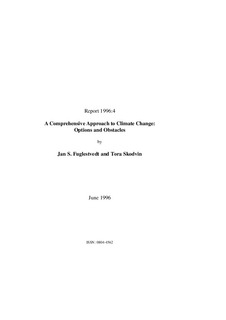A comprehensive approach to climate change: Options and obstacles
Research report
Permanent lenke
http://hdl.handle.net/11250/192110Utgivelsesdato
1996Metadata
Vis full innførselSamlinger
- CICERO Reports [210]
Sammendrag
The principle of comprehensiveness constitutes an important element in the climate convention, but guidelines as to how this principle is to be understood and implemented are not provided. In this analysis the meaning of this concept within the context of climate change is investigated: How should "comprehensiveness" be defined and operationalized and which scientific considerations need to be taken into account?
Understood as an approach by which all greenhouse gases are juxtaposed and parties are permitted to choose their individual reduction paths within a common framework, the comprehensive approach may constitute an important element in the development of adequate solution design models for a climate regime. The study discusses the criteria necessary for deciding which gases to include in a comprehensive approach, and, based on these criteria, a set of gases is proposed. The study also examines the requirements a method for comparing gases with different properties must fulfill in order to be able to employ a comprehensive approach as proposed. Estimations of the relative contribution of a particular gas to the enhanced greenhouse effect is very dependent upon the chosen time horizon. Moreover, the choice of horizon is linked to the kind of effect with which one is concerned. Thus, the selection of the time horizon is a choice with significant environmental and policy implications. Determining time horizons may prove to be a difficult one, and should be handled with care within the scientific, technical and political bodies of the climate convention.
There may be a lot to gain politically by adopting and developing a comprehensive approach, although it should be emphasized that a comprehensive approach may complicate, and most probably prolong, the negotiation process. There is a set of difficult questions which have to be settled among contracting parties in order for this approach to work as intended.
